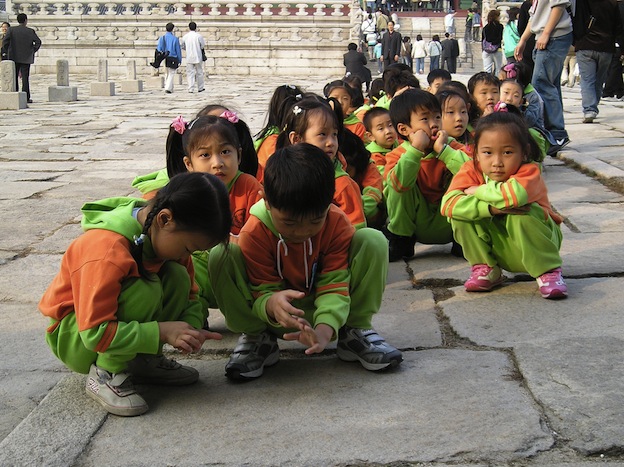SingaporeMotherhood | Preschooler & Up
September 2013
Bye Bye PSLE Score

Singapore is removing the current scoring system for the Primary School Leaving Examination (PSLE) to reduce competition among students and to increase non-academic development for the children.
The T-score, which was put in place in 1980, gives a student an aggregate score using a formula that compares his PSLE performance compared with his peers via a bell-curve. This will be removed and replaced by a banding system where students are given grades instead of an accumulated score, similar to the ‘O’ Level system.
[banner][/banner]
“At the age of 12, one examination, four papers and you want to measure your child to so many decimal points… this is a distinction that is meaningless, too fine to make,” said Prime Minister Lee Hsien Loong in his National Day Rally speech on August 18. “It doesn’t matter it’s a 91 A* or 99 A*. You don’t have to chase that last point.”
The PSLE, the first mandatory common examination a student in Singapore has to take, has been under criticism for fuelling unnecessary competition between children at a young age and deciding their future at too early a stage in life. Without the T-score, said Lee, “you will be able to sit back and you have the space to educate and develop the students more holistically.”
The announcement was met with relief by some parents.
“It’s already very stressful for children and parents, so this is a welcome change,” said Penelope Huang, 31, mother of a newborn. “I tried to register my child for a pre-school and he has to be the waiting list. Can you imagine the pressure further down the road?”
Mother of two, Samantha Wong, 40, said the change was long-awaited. “It should have been done long ago,” she said. “In fact the whole PSLE system shouldn’t exist. It’s no use putting our children through this and it’s unfair to kids who blossom later in life.”
Parts of her comments echoed that of Prime Minister Lee’s. “Who is going to grow up abler, more committed, more capable, better contributor to society,” Lee said in his speech. “At the age of 12, you can guess, you cannot tell.”
Finland, Seoul
Finland, which topped education services company Pearson’s survey as the best education system in the world, does not have a mandatory standardised test for children until they are 16. And it’s not compulsory to give grades to children until they are in Grade 8.

South Korea, the second-best, assigns students to schools by lottery or by location. The country abolished competitive entrance examinations in 1968. Schools, which were formerly ranked according to the quality of the students, are allocated students regardless of their grades.
Singapore’s school system has undergone several reforms over the years. Ranking of secondary schools by the students’ ‘O’ level academic scores was scraped in 2004 and a modified school banding introduced in the same year was removed in 2012. This was to get schools and parents to look beyond grades and to drive home the message that there is no single yardstick to measure how good a school is, the Ministry of Education wrote on its website, citing Education Minister Heng Swee Keat.
“Parents must realise that not every child needs to go to a top school, and they must focus on real learning,” former Raffles Girls’ School principal Carmee Lim was cited as saying in a Straits Times article on August 19.
However, the government will not be abolishing the PSLE any time soon. In a Today newspaper report on August 20, National Institute of Education (NIE) Director Lee Sing Kong said the removal of the examinations is not a viable option as there is no alternative objective testing tool. He added that other performance-based assessments require extensive subjectivity that may result in doubts from the public.
Kiasu Parents
As long as the “kiasu” or afraid-to-lose mentality isn’t changed, an overhaul of the system would not matter, said Lionel Lim, 36.
“The underlying mindset remains the same,” said the father of two, whose elder daughter is in Primary One this year. “Parents are still ‘kiasu’ and if the mentality doesn’t change, this won’t help. Are we still cancelling PE classes to revise for the exams?”
Lim doesn’t send his children for tuition classes and says he does not believe in “helicopter parenting”. Helicopter parenting refers to parents who hover over their children, paying extremely close attention to their child’s experience.
Prime Minister Lee said in his speech that he had heard of examples where parents take the year off to prepare their children for the examination. “The whole family takes the examination,” Lee said. “Everybody thinks it matters, heaven and earth.”
Naturally, there are skeptics who disagree with the change.
“If it’s not down to the last point, how do you decide which secondary school to go to?” asked Wong Kok Weng, 45, whose son is in Primary Five. “This is meritocracy. You study hard, you get what you reap. I don’t see anything wrong with it. We lived through this system and turned out just fine.”
Wei is a journalist who has recently started a Facebook site with his buddy to help students with PSLE queries.
All content from this article, including images, cannot be reproduced without credits or written permission from SingaporeMotherhood.
Follow us on Facebook, Instagram, and Telegram for the latest article and promotion updates.





